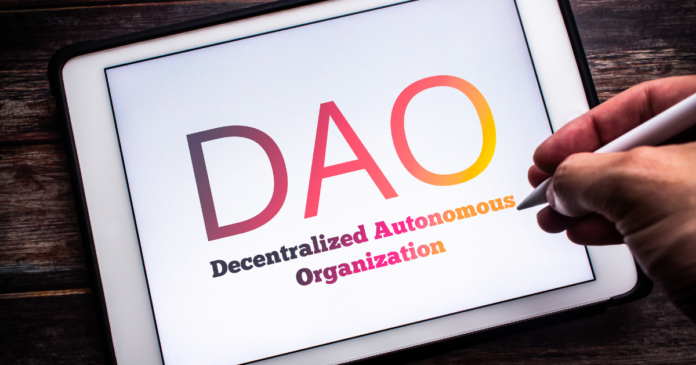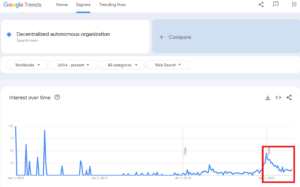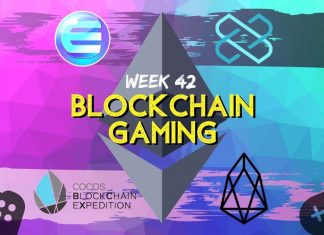In recent years have witnessed a notable decline in the adoption of DAOs. Raising questions about the factors contributing to this downturn.
According to Google Trends, the search interest in the topic “Decentralized autonomous organization” (DAOs) peaked (100 points) around the same time in 2021.
Source: Google Trends
In this article, we explore the various reasons behind the decrease in adoption within the DAO sector. Also, examine the challenges that have dampened the initial enthusiasm surrounding these decentralized entities.
1) Regulatory Uncertainty
One of the primary factors impeding the widespread adoption of DAOs is the evolving and uncertain regulatory landscape. Governments around the world are grappling with how to regulate decentralized technologies and DAOs. Being an experimental and relatively novel concept, find themselves in a gray area.
The lack of clear regulatory frameworks has made it challenging for businesses and individuals to confidently engage with DAOs. Leading to a cautious approach and reduced adoption.
One of the biggest barriers (if not THE biggest) for web3 and especially DAOs has been regulatory uncertainty.
2023 is likely to show us a lot of progress on this arenajust check what's happening in Japan, Marshal Islands, and a bit further behind the UK https://t.co/Twm2OjJ6cb
— Daniel Ospina (@_Daniel_Ospina) February 24, 2023
2) Security Concerns and Exploits
Security vulnerabilities and high-profile exploits have plagued the DAO sector, eroding confidence among users and potential adopters. Infamous incidents, such as the 2016 attack on “The DAO” resulted in the theft of millions of dollars. Highlighted the susceptibility of DAOs to smart contract vulnerabilities.
Despite advancements in security protocols, the specter of potential exploits continues to loom over the sector. Deterring both investors and developers from fully embracing DAOs.
🛡 Nemesis DAO moves to the Multi-Sig Consensus Mechanism in order to get rid of the security concerns with a single private key mechanism and to reduce the dependency on one person during the decision-making process.
👉Join Now: https://t.co/nktUk5n8Uq#BSC #BSCGems $TIME $OHM
— NemesisPRO (@nemesis_dao) December 29, 2021
3) Complexity and Usability Issues
The complexity of setting up and participating in DAOs has been a significant barrier to widespread adoption. While the underlying technology is sophisticated, the user interfaces and overall user experience often leave much to be desired. The intricacies involved in voting mechanisms, proposal submissions, and governance processes can be daunting for newcomers, discouraging broader participation.
4/ First, Maker needs to reduce the complexity of how it is governed by creating self-sustainable DAOs called MetaDAOs.
One can think of Maker Core as L1 Ethereum: slow and expensive, but secure.
While MetaDAOs are L2 solutions: fast & nimble, that get security from the L1. pic.twitter.com/gETHGEXJJb
— Ignas | DeFi Research (@DefiIgnas) August 30, 2022
Simplifying the user experience and enhancing the accessibility of DAO platforms could play a pivotal role in reigniting interest in these decentralized entities.
4) Lack of Standardization
The absence of standardized frameworks and interoperability between different DAO platforms has hindered their seamless integration into the broader blockchain ecosystem. Each DAO may have its unique structure, governance mechanisms, and tokenomics, making it challenging for users and developers to navigate and engage with multiple DAOs simultaneously.
1/ Most DAOs are highly fragmented and inefficient.
The current lack of standardization requires DAOs to reconcile data across each tool utilized in their tool stack.
The answer: the blockchain, through the integration of identity and social graphs.🧵 pic.twitter.com/PjofG75ioA
— Messari (@MessariCrypto) March 15, 2023
The lack of standardization has fragmented the DAO landscape, impeding the collaborative potential that these entities could achieve through shared standards and interoperability.
5) Scalability Challenges
Scalability remains a pervasive challenge for many blockchain networks, and DAOs are no exception. As the number of participants and transactions within a DAO grows, scalability issues can hamper the efficiency and responsiveness of the governance processes.
1/ In the #entertainment industry, the traditional centralized structures of event management are facing challenges in terms of scalability & transparency. ⚠️
Say hello to #DAOs. 🌐
An Article & a Thread… 📄🧵https://t.co/GUdb96BInm
— Cheers Finance 🥂 (@CheersFinance) January 21, 2023
High transaction fees and network congestion during periods of high demand can further exacerbate these challenges. Until blockchain networks can address scalability concerns, the mass adoption of DAOs may remain limited.
6) Maturity and Learning Curve
The DAO sector is still in its infancy, and the learning curve for participants can be steep. Both individuals and organizations need time to understand the intricacies of decentralized governance and adapt their decision-making processes.
"Yesterday was a tectonic shift in finance". MakerDAO is on the bleeding edge of standardizing how DAOs and the legal system will interact to connect DeFi to TradFi. Real World Assets are here, and a sign of the growing maturity of DeFi. pic.twitter.com/bJDFzJESrV
— Niklas KunkΞl 📖 (@nomos_paradox) April 20, 2021
The gradual maturation of the DAO sector, coupled with educational initiatives to demystify the complexities, may help overcome the existing learning curve and drive increased adoption over time.
Conclusion
The decline in the adoption of Decentralized Autonomous Organizations is a multifaceted issue, influenced by regulatory uncertainties, security concerns, usability challenges, lack of standardization, scalability issues, and the inherent learning curve associated with this nascent technology.
Addressing these challenges requires concerted efforts from the blockchain community, including regulators, developers, and users, to collaboratively build a more secure, user-friendly, and standardized environment for DAOs. As the sector evolves, overcoming these hurdles could pave the way for a resurgence in the adoption of DAOs, unlocking their full potential as catalysts for decentralized decision-making and governance.
Disclaimer
The information discussed by Altcoin Buzz is not financial advice. This is for educational, entertainment, and informational purposes only. Any information or strategies are thoughts and opinions relevant to the accepted levels of risk tolerance of the writer/reviewers and their risk tolerance may be different than yours. We are not responsible for any losses that you may incur as a result of any investments directly or indirectly related to the information provided. Bitcoin and other cryptocurrencies are high-risk investments so please do your due diligence. Copyright Altcoin Buzz Pte Ltd.






























